 Both the Saturday and the Sunday edition of The Kathmandu Post carried articles on the International Conference on Education in a Federal Nepal. The coverage of this two-day conference (which ran on Friday and yesterday) included Prof. Stephen Tee’s keynote speech and Prof. Edwin van Teijlingen reporting on research findings of an education study amongst health educators in Nepal, as well as FHSS’s Visiting Faculty, Prof. Padam Simkhada (based at Liverpool John Moores University). The conference organised by HISSAN and supported by 16 education partners including Bournemouth University, Liverpool John Moores University and The University of Utah (USA) was attended by some 400 delegates.
Both the Saturday and the Sunday edition of The Kathmandu Post carried articles on the International Conference on Education in a Federal Nepal. The coverage of this two-day conference (which ran on Friday and yesterday) included Prof. Stephen Tee’s keynote speech and Prof. Edwin van Teijlingen reporting on research findings of an education study amongst health educators in Nepal, as well as FHSS’s Visiting Faculty, Prof. Padam Simkhada (based at Liverpool John Moores University). The conference organised by HISSAN and supported by 16 education partners including Bournemouth University, Liverpool John Moores University and The University of Utah (USA) was attended by some 400 delegates.
Tagged / CEL
First FHSS publication 2018
 Congratulations to PhD student Folashade Alloh and Faculty of Health & Social Sciences academics Dr. Desiree Tait and Dr. Clare Taylor on the first academic publication for 2018. Their paper ‘Away from home: A qualitative exploration of health experiences of Nigerian students in a UK university’ has been published in the Journal of International Students.
Congratulations to PhD student Folashade Alloh and Faculty of Health & Social Sciences academics Dr. Desiree Tait and Dr. Clare Taylor on the first academic publication for 2018. Their paper ‘Away from home: A qualitative exploration of health experiences of Nigerian students in a UK university’ has been published in the Journal of International Students.
Prof. Edwin van Teijlingen
CMMPH
BU midwifery research at the international Normal birth research conference
The Normal birth research conference is an annual, international event that takes place to focus on less complicated aspects of pregnancy and birth. This year it took place in the beautiful surroundings of Grange-over-sands overlooking Morecambe bay and on the edge of the Lake District. On this occasion there were delegates from over 20 countries including Canada, USA, New Zealand, Australia, Brazil, Poland, Spain, the Netherlands, Sweden, Norway and India! The attendees included midwives, obstetricians, birth supporters, architects, artists, geographers and educators as well as representatives of the World Health organisation, charities and Baroness Cumberlege from the UK House of Lords.
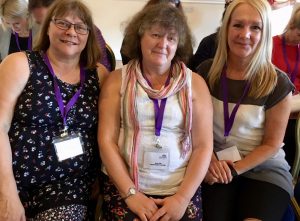
Sara Stride, Jenny Hall, and Jane Fry at the conference
Research at Bournemouth University was well represented from CMMPH, CQR and CEL. Midwifery lecturer, Sara stride, on behalf of the research team of Professor Vanora Hundley and Dr Sue Way, presented a poster of their work, ‘a qualitative study to explore UK midwives’ individual practice, beliefs and attitudes regarding perineal care at the time of birth’. Dr Jane Fry, also from the midwifery team, presented a research topic on her Doctoral work, ‘ A descriptive phenomenological study of independent midwives’ use of intuition as an authoritative form of knowledge during women’s labours and births’. She also facilitated a workshop titled ‘ Finding your own intuition: a workshop designed to explore practitioners’ ways of knowing during childbirth’ .
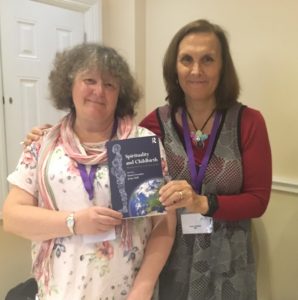
Jenny Hall with Professor Susan Crowther at the book launch [(c) Sheena Byrom]
The impression taken away was the passion and importance of more evidence required around more ‘normal’ aspects of pregnancy and birth, especially in countries with less resources. There is considerable humanising of care being carried out internationally, and is a key focus at the World health organisation. A focus for the UK midwifery is current maternity services transformation, yet much of the global focus is on the importance of transformation in line with the recent Lancet series on maternity, and international collaboration to achieve the goals for Sustainable development. As a force, the team behind normal birth research serve this area powerfully, in informing care for women, babies and families across the global arena. The final rousing talk by Australian professor Hannah Dahlen, to the current backlash to ‘normal birth’ in the media was inspiring and is an editorial in the international journal Women and Birth. Next year the conference is in Michigan, USA!
Human rights study day in maternity care
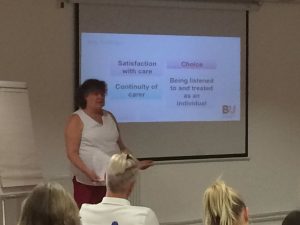 On 26th September the branch of the RCM in Southampton held a study day dedicated to considering human rights concerns in maternity care. It was attended by over 50 practitioners from across the region. Topics covered included a workshop by the human rights in maternity charity, Birthrights, and speakers from Barnados and Stop the Traffik. These latter presenters provided thought provoking, and somewhat harrowing, evidence for the need for awareness of sexual exploitation in young people, and trafficking of humans in our areas of practice. In addition Dr Jenny Hall (pictured right) from CEL and Jillian Ireland, visiting researcher in CMMPH, discussed the human rights of women with disability, based on current research partially funded by Birthrights, undertaken with colleagues Professor Vanora Hundley and Dr Bethan Collins from Liverpool University.
On 26th September the branch of the RCM in Southampton held a study day dedicated to considering human rights concerns in maternity care. It was attended by over 50 practitioners from across the region. Topics covered included a workshop by the human rights in maternity charity, Birthrights, and speakers from Barnados and Stop the Traffik. These latter presenters provided thought provoking, and somewhat harrowing, evidence for the need for awareness of sexual exploitation in young people, and trafficking of humans in our areas of practice. In addition Dr Jenny Hall (pictured right) from CEL and Jillian Ireland, visiting researcher in CMMPH, discussed the human rights of women with disability, based on current research partially funded by Birthrights, undertaken with colleagues Professor Vanora Hundley and Dr Bethan Collins from Liverpool University.
It was an intense event that demonstrated the importance of discussing and researching these aspects of current midwifery care.
New paper Dr. Jenny Hall
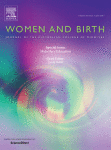 Congratulations to Dr. Jenny Hall in the Faculty of Health & Social Sciences (FHSS) on her new published discussion paper ‘Educating student midwives around dignity and respect’ in the international journal Women and Birth (published by Elsevier). The paper, co-authored with Mary Mitchell (University of the West of England), discusses the issue that there is currently limited information available on how midwifery students learn to provide care that promotes dignity and respect.
Congratulations to Dr. Jenny Hall in the Faculty of Health & Social Sciences (FHSS) on her new published discussion paper ‘Educating student midwives around dignity and respect’ in the international journal Women and Birth (published by Elsevier). The paper, co-authored with Mary Mitchell (University of the West of England), discusses the issue that there is currently limited information available on how midwifery students learn to provide care that promotes dignity and respect.
Well done!
Prof. Edwin van Teijlingen
Centre for Midwifery, Maternal & Perinatal Health
Reference:
- Hall, J., Mitchell, M. (2017) ‘Educating student midwives around dignity and respect’, Women & Birth 30(3): 214-219.
New paper published by CMMPH’s Dr. Susan Way
This week saw the pre-publication of ‘Core principles to reduce current variations that exist in grading of midwifery practice in the United Kingdom’ in Nurse Education in Practice. This paper is co-authored by Dr. Susan Way in the Centre for Midwifery, Maternal & Perinatal Health (CMMPH). The authors argue that these core principles could contribute to curriculum development in midwifery and other professions internationally.
Congratulations!
Prof. Edwin van Teijlingen
Reference:
- Fisher, M., Way, S., Chenery-Morris, S., Jackson, J., Bower, H.
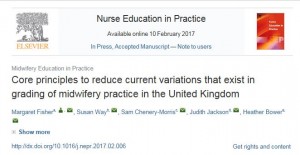 (2017) Core principles to reduce current variations that exist in grading of midwifery practice in the United Kingdom, Nurse Education in Practice (forthcoming) see: http://www.nurseeducationinpractice.com/article/S1471-5953(17)30092-6/abstract
(2017) Core principles to reduce current variations that exist in grading of midwifery practice in the United Kingdom, Nurse Education in Practice (forthcoming) see: http://www.nurseeducationinpractice.com/article/S1471-5953(17)30092-6/abstract
The first year student experience – ‘stay-at-home’ students
Colleagues,
A ‘hot-off-the-press’ publication exploring students experience living at home – maybe of interest to staff busy welcoming our new students, Debbie Holley
=====
Commuting, transitions and belonging: the experiences of students living at home in their first year at university (Pokorny, Holley, Kane)
In this study, our cross-case analysis of students’ lives challenges the conventional home–university model of transition and highlights the importance of acknowledging the influence of this complex symbiotic relationship for students who attend university and live at home. We argue that as with stay-at-home holidays, or “staycations”, which are of such crucial importance to the tourism industry, so stay-at-home students or commuter students are vital to higher education and the term utilised here is “stayeducation”. Through the narratives of “stayeducation” students, we see how family and community aspects of students’ lives are far more significant than previously realised, and our study suggests that these heavily influence the development of a student sense of belonging. Drawing upon biographical narrative method, this paper introduces three first-year Business and Economics students enrolled at different universities in London and explores their journeys through their transition through home, school and early university life. Ways in which key themes play out in the transition stories of our students and the challenges and obstacles for the individual are drawn out through the cross-case analysis. Findings support the existing literature around gender, class and identity; however, new insights into the importance, for these students, of family, friendships and community are presented. Our work has implications for academic staff, those writing institutional policies, and argues for the creation of different spaces within which students can integrate into their new environment.
This article is gold open access and can be accessed here:
http://link.springer.com/article/10.1007/s10734-016-0063-3
Try something different
With its vast agile space, glass-fronted seminar rooms and buzzing collaborative zones, BU’s new Fusion Building offers the perfect opportunity to reimagine learning scenarios – both inside the new walls and elsewhere on our campuses.
The Centre for Excellence in Learning (CEL) is supporting staff to ‘try something different’ and inspire our students through innovative learning.
- There are resources on the Try something different pages of the CEL website, looking specifically at how academics can use the spaces for different learning scenarios.
- The Try something different video includes advice from BU’s Professor Stephen Heppell, who is a world expert in contemporary learning.
- A series of i:Innovate workshops will help staff explore different technologies to deliver the curriculum, take new approaches to assessment and feedback, reimagine teaching large groups and much more. View the full list of i:Innovate workshops on the Staff Intranet.
Try something different today – and see where it takes you.
CELebrate 2016
Workshops, presentations and poster sessions showcasing pedagogic best practice.
CELebrate 2016 takes place from Wednesday 13 – Friday 15 April 2016. This is the ideal opportunity to think about new pedagogic approaches and good ideas to enhance the student learning experience.
We have three external speakers coming – Professors Jane Seale from Exeter, John Cook from UWE and Peter Bryant from LSE – and over 30 internal colleagues showcasing best practice through presentations, poster sessions and workshops.
You can find out about all sessions and book via the CELebrate 2016 pages, or view events by the following pedagogic themes:
- Technology enhanced learning
- Research engaged learners
- Assessment and feedback
- Work based learning and employability
- Innovative pedagogy
For more information, contact cel@bournemouth.ac.uk.
Join the discussion via #CELebrate2016.
If any postgraduate researchers are unable to access the Staff Intranet, please email Organisational Development.

Latest BU Nursing publication
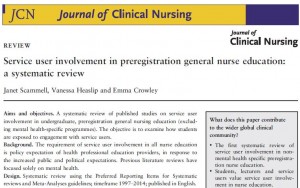 Congratulations to Janet Scammell, Vanessa Heaslip and Emma Crowley in FHSS on their new publication which appeared at the very end of 2015. Their most recent paper is the first systematic review of service user involvement in non-mental health specific preregistration nurse education. The paper ‘Service user involvement in preregistration general nurse education: a systematic review’ is published in the current issue of the Journal of Clinical Nursing. [1]
Congratulations to Janet Scammell, Vanessa Heaslip and Emma Crowley in FHSS on their new publication which appeared at the very end of 2015. Their most recent paper is the first systematic review of service user involvement in non-mental health specific preregistration nurse education. The paper ‘Service user involvement in preregistration general nurse education: a systematic review’ is published in the current issue of the Journal of Clinical Nursing. [1]
Well done!
Prof. Edwin van Teijlingen
CMMPH
Reference:
- Scammell, J., Heaslip, V., Crowley, E. (2015) ‘Service user involvement in preregistration general nurse education: a systematic review’ Journal of Clinical Nursing 25:53-69.
Introduction to Education Practice: A Programme for Research Students
The next session of our ‘Introduction to Education Practice‘ course will run from the 24th to the 26th of February.
This is a research-driven, practice-based course, aimed at doctoral students who are or will be supporting teaching activities.
The course has three main aims:
• To introduce students to theoretical and practical knowledge on adult learning, with special emphasis on the UK context.
• To familiarise students with BU’s services and schemes for teaching and learning, as well as with leaning technology tools.
• To provide students with opportunities to discuss and reflect about their particular teaching goals, and to offer a collegial space where they can receive feedback on their teaching practice.
 Topics covered in the course include:
Topics covered in the course include:
• The student experience of learning.
• Planning student-centred learning.
• Working in large and small groups.
• Assessment for learning.
• The potential of learning technology.
On the last day we celebrate our students’ learning by engaging them in a micro-teaching task, where they receive feedback and recommendations to improve their teaching practice.
The course is supported through materials in myBU.
To see images and resources shared by previous cohorts, check out out #TeachBU on Twitter.
Programme organiser: Dr Jaccqueline Priego (CEL).
To book a place please contact Organisational Development od@bournemouth.ac.uk
This post was previously published on the BU’s Centre for Excellence in Learning (CEL) Blog and is reproduced here with permission.
Serendipitous Impact and the Power of No: lessons from CEMP’s Research Away Day
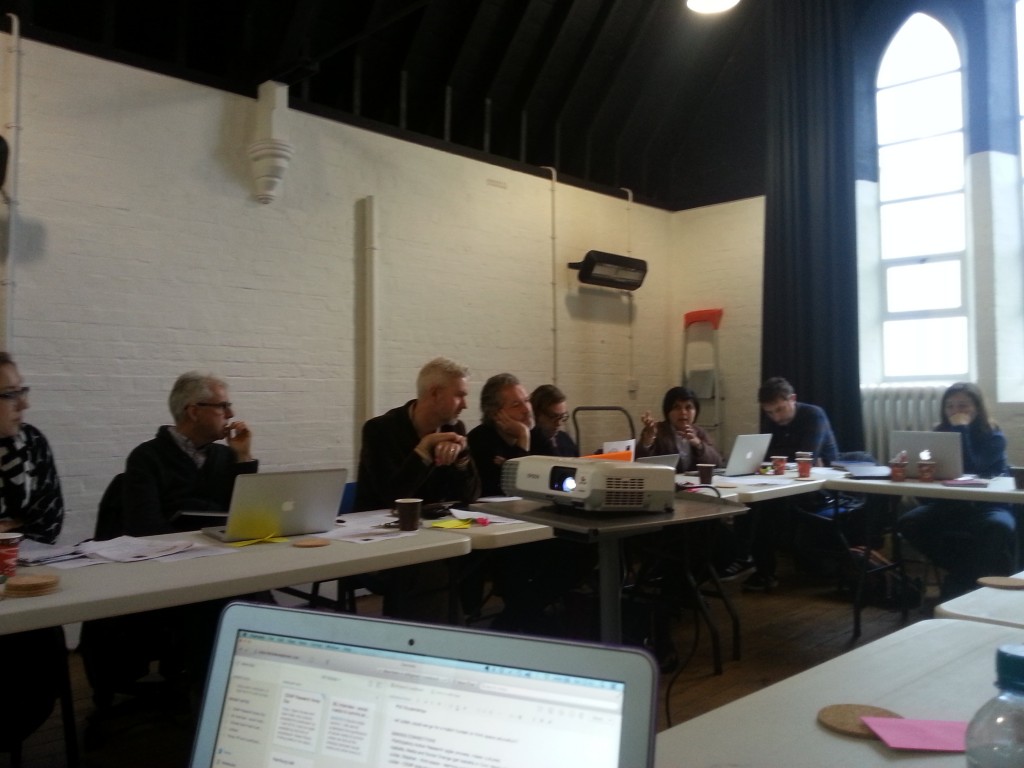 On Friday February 13, 2015 eighteen researchers across all stages of their careers came together for our CEMP Research Away Day. Hosted at the Old School House By the Sea in Boscombe, the day focused on how we can foster our media & education research culture, from REF strategy to collaboration building, both at BU and beyond.
On Friday February 13, 2015 eighteen researchers across all stages of their careers came together for our CEMP Research Away Day. Hosted at the Old School House By the Sea in Boscombe, the day focused on how we can foster our media & education research culture, from REF strategy to collaboration building, both at BU and beyond.
Kicking us off with REF and Impact, Rebecca Edwards from RKEO spoke about key issues including the new Open Access Guidelines and how we can work to evidence our impact. She summed up 8 key points to takeaway:
1. Know your Open Access
2. Go Gold when possible – use RKEO fund
3. Collaborate with other institutions and international colleagues
4. Identify and developing Impact Case Studies
5. Evidencing your Impact as you go along (testimonials, visitor counts, etc)
6. Promote your research on the BU research website
7. Aim to increase research income
8. Focus on PhD registrations and completions
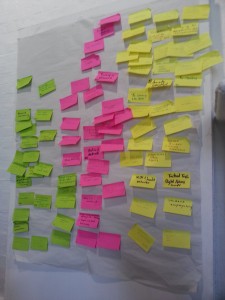 Sound like a gigantic task for just one person? These goals are not for individuals to accomplish alone. Working in teams and groups is key for doing innovative research, producing outputs and building successful bids. Making connections between our work is a necessary beginning.
Sound like a gigantic task for just one person? These goals are not for individuals to accomplish alone. Working in teams and groups is key for doing innovative research, producing outputs and building successful bids. Making connections between our work is a necessary beginning.
Isabella Rega’s Making Connections session got the group talking about where our interests intersect. Using three different coloured post-it notes, we wrote down the issues (green), methods (pink) and stakeholders (yellow) that we work with. Participatory research methods, HE teaching and learning, and Education and Social Change emerged as key overlaps.
Out of these connections some concrete plans emerged, including turning fusion project output into educational resources and a participatory methods workshop day.
From project plans to project afterlife, we shifted to speak about documenting and evidencing impact. We looked at four case studies of research projects including ETAG and Copyrightuser.org, their significance and who they reached. Rebecca Edwards provided advice on how we evidence, measure and track our project’s impact. Sometimes these impacts can be anticipated, but more often there is serendipity and surprise.
-Tiers of influence
-Is influencing an organisation enough? How do we understand what this was?
-Testimonials
-Formal letters from key institutions
-If you’ve done research at another institution it doesn’t count at our institution. Impact stays at institution. Reason is because it is usually about groups.
-Entire groups can be rewarded for impact
-Demonstrate the evidence of impact on policy —> Following the story
-Distinct contribution of the University
-Can’t always see the impact from the outset —> serendipity involved, not always
-visitors counts and the result of them
After a tasty, if unidentifiable food-filled lunch from Bosconova, we ran a reflection session on barriers to research bidding and publishing. Designed to get us thinking about the personal and structural constraints on our research, the session helped us room-source practical solutions to common challenges.
Richard Wallis got us back up on our feet with a enthusiastic round of Research Speed Dating. Partnering up with colleagues for short bursts of time, we quickly exchanged project ideas offering feedback and fostering more research connections. Julian McDougall and Richard Berger rounded out the afternoon with a go-around. Everyone shared their upcoming plans and outlined the support they would need to achieve them.
Described by participants as a “fantastic day,” we left feeling the best kind of inspired: more excited and less exhausted about the research plans that lay ahead for CEMP’s growing educational research community.
Anna Feigenbaum is a CEMP Fellow. To find out more about CEMP and how to get involved, check out the website: http://www.cemp.ac.uk/
Paper added to CEL collection
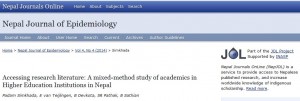
The latest paper of BU’s Centre for Excellence in Learning (CEL) was published in the Nepal Journal of Epidemiology. The lead author Padam Simkhada (BU Visiting Faculty) together with BU’s Edwin van Teijlingen and three academic colleagues in Nepal published their paper: ‘Accessing research literature: A mixed-method study of academics in Higher Education Institutions in Nepal’ [1].
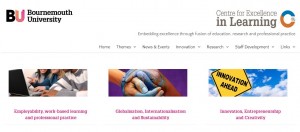
This latest paper reports on the knowledge of and practice in accessing electronic research-based evidence among university teachers in the health and medical field in Nepal. This paper originates from a recently finished DelPHE (Round 4), British Council: award. The study called Partnership on Improving Access to Research Literature for HE Institutions in Nepal (PARI Initiative) was a collaboration between Tribhuvan University, Kathmandu, Nepal, the University of Sheffield and BU’s School of Health & Social Care. This is the second paper to appear from the PARI study, the first paper reported on research methods teaching [2].
The paper argues that accessing electronic research literature provides an opportunity to gathering up-to-date research-based information that should be core to all health curricula in Nepal. The authors call upon curriculum developers and university authorities in Nepal to revise health curricula and help build electronic searching skills among staff and students.
The Nepal Journal of Epidemiology is a full Open Access journal which means anybody across the globe can access it for free.
References:
- Simkhada, P., van Teijlingen, E., Devkota, B., Pathak, R.S., Sathian, B. (2014) Accessing research literature: A mixed-method study of academics in Higher Education Institutions in Nepal, Nepal Journal of Epidemiology 4(4): 405-14. http://www.nepjol.info/index.php/NJE/article/view/11375
- Simkhada, P., van Teijlingen, E., Pokharel, T., Devkota, B., Pathak, R.S. (2013) Research Methods Coverage in Medical & Health Science Curricula in Nepal, Nepal Journal Epidemiology 3(3): 253-258. www.nepjol.info/index.php/NJE/article/view/9185
Prof. Edwin van Teijlingen
Centre for Midwifery, Maternal & Perinatal Health
Bournemouth University
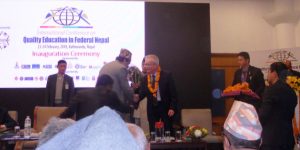
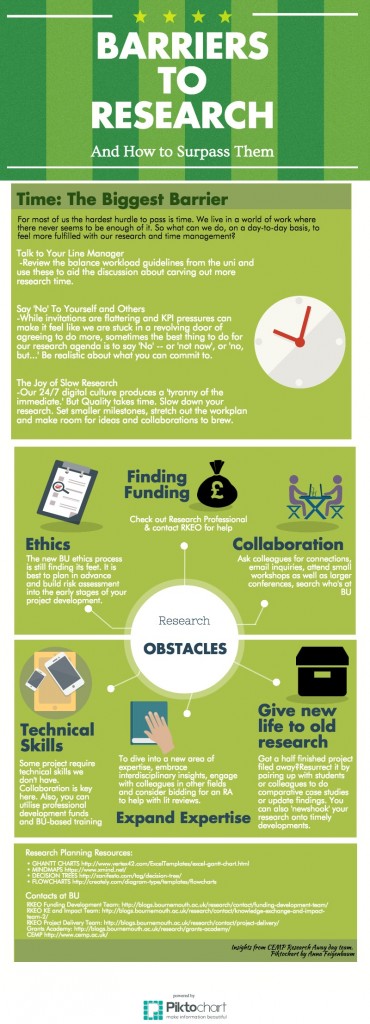











 Beyond Academia: Exploring Career Options for Early Career Researchers – Online Workshop
Beyond Academia: Exploring Career Options for Early Career Researchers – Online Workshop UKCGE Recognised Research Supervision Programme: Deadline Approaching
UKCGE Recognised Research Supervision Programme: Deadline Approaching SPROUT: From Sustainable Research to Sustainable Research Lives
SPROUT: From Sustainable Research to Sustainable Research Lives BRIAN upgrade and new look
BRIAN upgrade and new look Seeing the fruits of your labour in Bangladesh
Seeing the fruits of your labour in Bangladesh ECR Funding Open Call: Research Culture & Community Grant – Apply now
ECR Funding Open Call: Research Culture & Community Grant – Apply now ECR Funding Open Call: Research Culture & Community Grant – Application Deadline Friday 12 December
ECR Funding Open Call: Research Culture & Community Grant – Application Deadline Friday 12 December MSCA Postdoctoral Fellowships 2025 Call
MSCA Postdoctoral Fellowships 2025 Call ERC Advanced Grant 2025 Webinar
ERC Advanced Grant 2025 Webinar Update on UKRO services
Update on UKRO services European research project exploring use of ‘virtual twins’ to better manage metabolic associated fatty liver disease
European research project exploring use of ‘virtual twins’ to better manage metabolic associated fatty liver disease